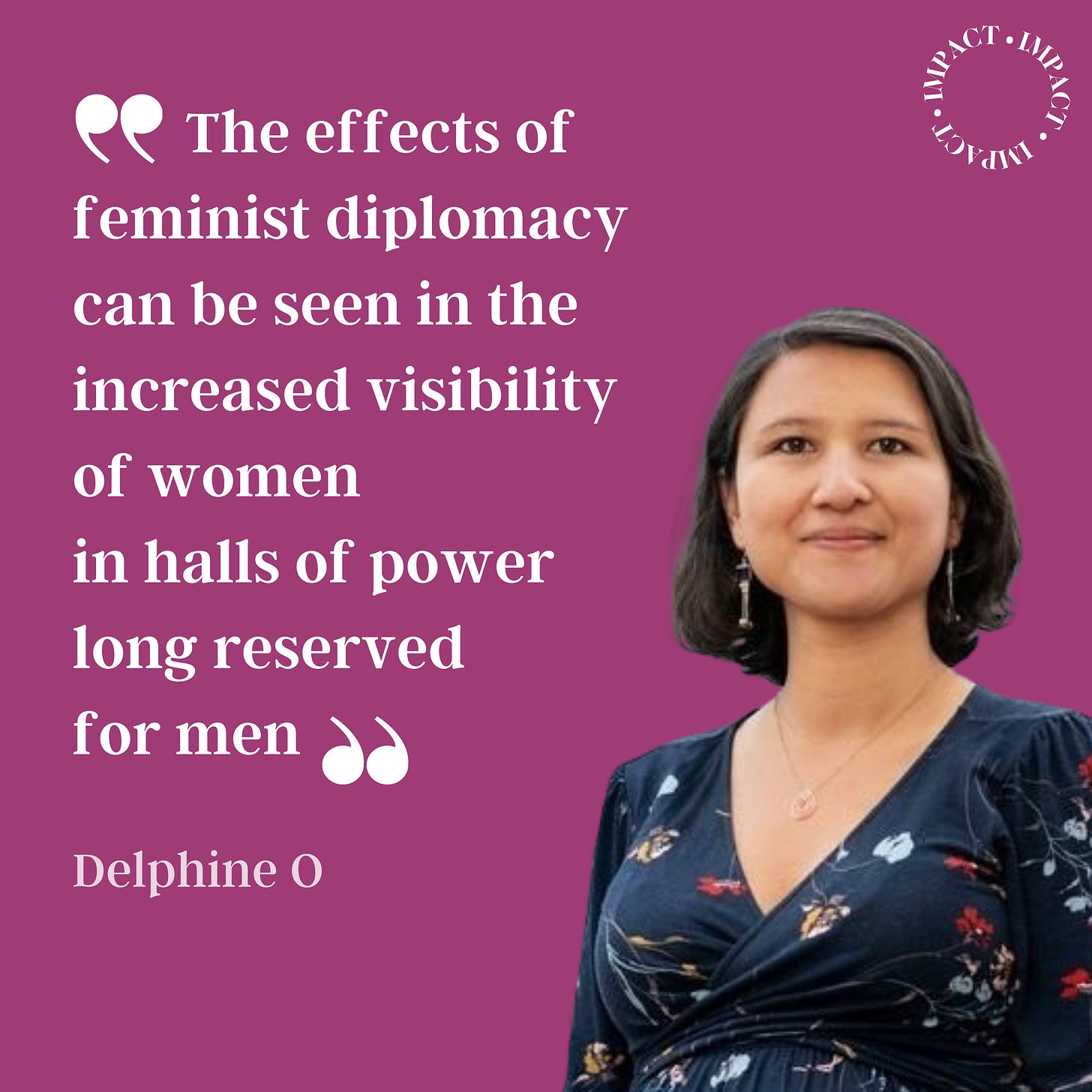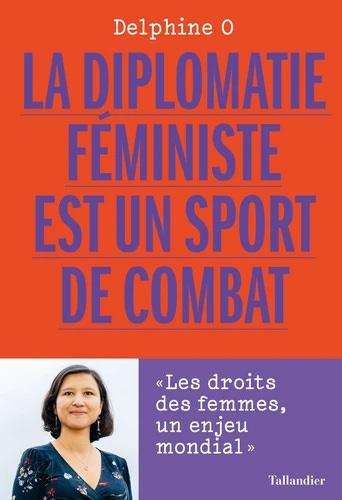Sweden’s feminist foreign policy — a cautionary tale
“Rights can never been taken for granted”
Welcome to the Impact newsletter, your guide to all that’s making news in international feminism. This week, we bring you an extract from the new book by Delphine O, ambassador and secretary general of the Generation Equality Forum. In it, she tells the story of the world’s first feminist foreign policy — from its greatest successes to its ultimate demise.
If you’re pressed for time, here’s the newsletter in a nutshell:
- 🇸🇪 Nine years ago, Margot Wallström created the world’s first feminist diplomacy policy in Sweden.
- ❌ Her vision was to put women’s rights at the centre of the diplomatic agenda, but she encountered opposition from Russia, Saudi Arabia and her own country.
- 🧐 Sweden has since abandoned its pioneering policy. What went wrong and what lessons can other countries learn from it? Read on to find out more.
📕 You can win a copy of « La diplomatie féministe est un sport de combat » (nota bene, it’s in French) by replying directly to this email. Good luck! 📕
And if you want to stay up to date on feminist news from around the world, follow us on Instagram and LinkedIn.
By Delphine O
When the Swedish foreign minister, Margot Wallström, announced at the end of 2014 that her country’s foreign policy would be « feminist », she was laughed at by the media, the political sphere and the international community. This idea of feminist diplomacy, the contours and content of which were not yet known, was immediately mocked and ridiculed.
What was this new fad in this small Scandinavian country? Isn’t diplomacy a serious subject, dealing with serious and urgent issues such as war and peace, international security, trade, power rivalry and threats to the global equilibrium, not « women’s issues »? In some cases, the concept was presented as diplomacy conducted solely by women to the exclusion of men. Many observers interpreted the term « feminism » as referring to an ideological and militant fringe of society, failing to see the link between a state’s foreign policy and the issue of women’s place in society.
Wallström was proposing a profound transformation in the theory and practice of diplomacy. Her plan to put women’s rights at the heart of the diplomatic agenda and to assert a vision of emancipation was in fact a response to pushback from conservative governments. Concerted, systematic and mobilising action was needed in the face of the new onslaught of regressive forces. To achieve this, progressive governments needed to move women’s rights up their agenda of strategic priorities, just as reactionary governments made their fight for a return to « family values » a priority of their foreign policy.
Swedish feminist diplomacy was based on the three « Rs »: Rights (of women and girls), Representation (women’s participation in decision-making bodies) and Resources (allocation of human and financial resources and funding for feminist movements). A fourth « R » was later added: Reality (anchoring feminist diplomacy in local realities).

The first test of this new diplomacy came the year after it was adopted, when Foreign Minister Margot Wallström found herself in the middle of a diplomatic incident with Saudi Arabia.
In February 2015, Wallström gave a speech denouncing the oppression of women by the Saudi state before the Swedish Parliament. She described the punishment of 1,000 lashes and ten years in prison meted out to blogger and freedom expression campaigner Raif Badawi as « mediaeval », denouncing the country’s « cruel attempt to silence modern forms of expression ». Saudi Arabia’s reaction was swift: it withdrew its ambassador in Stockholm, refused visas to Swedish businesspeople, issued a public statement via the Organisation of Islamic Cooperation criticising the minister. The Gulf Cooperation Council condemned her remarks as « flagrant interference in internal affairs, which is not accepted in international conventions ». The Swedish minister’s participation in the Arab League summit, scheduled for a month later, was abruptly cancelled under Saudi pressure.
These outraged reactions were connected to another event with major geopolitical consequences. A few weeks after Mrs Wallström’s speech, the Swedish government decided not to renew a memorandum of military cooperation and exchange of weapons technology with the Saudi kingdom. This decision was fraught with strategic and economic consequences for Sweden, which, despite its image as a peaceful country on the international stage, is a major arms exporter. Was it dictated by a need for consistency with the announcement of feminist diplomacy? It’s hard to say. Internal political factors may have been at play. The world, and in particular the world of feminist movements, was in shock: could feminist diplomacy really be so powerful?
The rest of the story showed, however, that the successes of feminist diplomacy are not to be found in spectacular coups and sensational decisions – quite the contrary. A week after Wallström’s speech, Sweden sent an official delegation to Saudi Arabia to deliver letters from Prime Minister Stefan Löfven and King Charles XVI Gustave with the explicit aim of easing diplomatic tensions. The letters, which explained that the minister had no intention of criticising Islam and offered an official apology for « any misunderstanding », were a response to the concerns of Swedish industrialists worried about the damaging economic consequences of ongoing friction with the Saudi kingdom.
For her part, Wallström refused to apologise, but also referred to a « misunderstanding » – a diplomatic tactic known for not giving ground while avoiding making the other party lose face. Since then, Swedish arms exports to Saudi Arabia have continued unabated. In fact, they have increased due the war in Yemen, where the military operations carried out by Saudi Arabia and the United Arab Emirates included the bombing of hospitals, schools, markets and wedding venues have been fiercely criticised by NGOs.
Parlez-vous français ? Impact is also available in French:
Wallström’s misadventures after the announcement of feminist diplomacy should not obscure the real and serious efforts undertaken by the Swedish government to prioritise gender equality in its international action since 2014. She took advantage of her time as President of the United Nations Security Council (2017-2018) and the Organisation for Security and Cooperation in Europe (2021) to put women’s rights at the top of the agenda of two major international law organisations. As president of the Security Council, she systematically introduced a gender perspective into discussions on peace and security, and insisted that UN mission mandates and official statements included references to the status of women. During this time, Sweden worked to ensure that gender-based violence and sexual violence become a criterion for international sanctions.
The effects of feminist diplomacy can also be seen in the increased visibility of women in halls of power long reserved for men. Under the Swedish presidency, representatives of NGOs, particularly women’s rights organisations, were regularly invited to brief members of the Security Council, a rare privilege which gives such organisations an unprecedented platform and visibility to make their case to the world’s leaders. In total, half of the external speakers invited to address the Council in 2018 were women.
In 2021, the Swedish presidency of the Organization for Security and Co-operation in Europe, under the leadership of Wallström’s successor in the foreign ministry, Ann Linde, did not enjoy similar success. Although Sweden had once again announced that it would make gender equality one of the priorities of its mandate at the head of this organisation, which is made up of 57 states, its attempts to include more women in the conflict resolution process were not taken up by members. When the Swedish presidency proposed a resolution affirming the need to strengthen the place of women in society in order to promote global security, it was vetoed by Russia and the Vatican City.
The Swedish Ministry of Foreign Affairs cites a range of successful actions taken as part of its feminist diplomacy: the inclusion of gender equality in the peace treaty between the Colombian government and FARC rebels in 2016; the adoption of new regulations promoting the participation and representation of women in politics in Moldova and Somalia; changes in legislation in a handful of countries on combating gender-based violence and eradicating female genital mutilation and early marriage. It is difficult to assess the extent to which Sweden played a defining role in these positive advances, but it is clear that its diplomatic leadership and activism have helped to put women’s rights on the agenda where they had previously been largely absent.
Where is Swedish feminist diplomacy in 2023? To the dismay of NGOs and progressive nations, the country that invented feminist diplomacy and is regarded as a model of gender equality the world over elected a coalition of right-wing and far-right parties in October 2022. Soon after Prime Minister Ulf Kristersson presented the new government, the new Minister for Foreign Affairs, Tobias Billström, announced that Sweden would be abandoning feminist diplomacy on the grounds that « the label has become more important than the content », noting nonetheless that « gender equality remains a core value for the Swedish government « .
The decision to abandon the name « feminist diplomacy » may be more of a media stunt than a genuine step backwards. Indeed, it does not appear that the Swedish Ministry of Foreign Affairs has made any major cuts in the budgets dedicated to gender equality. Its position in multilateral bodies has not changed considerably, but NGOs are cautiously observing any developments that might signal a reversal of position.
The decision to abandon feminist diplomacy seems to have been motivated by domestic political considerations, with right-wing and far-right parties marking their difference from the previous social-democratic government, and by international factors. Sweden’s membership of NATO and the trend towards remilitarisation in the context of the war in Ukraine have also led the government to prioritise military spending at the expense of official development aid.
But the impact of the decision is still significant. It is a symbol of yet another backlash, this time in a country recognised for its international action and advocacy in favour of gender equality. Sweden’s about-turn is a powerful reminder that rights can never be taken for granted.
This is a translated and edited excerpt from La diplomatie féministe est un sport de combat – Les droits des femmes, un enjeu mondial by Delphine O, ambassador-at-large and Secretary General for the Generation Equality Forum at the French Ministry of Foreign Affairs.

